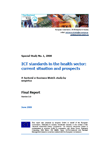 This new study about ICT standards in the health sector by empirica provides a structured overview of eHealth standards development and uptake in a European context, paying special attention to standards for electronic health records. The study was commissioned by the European Commission's Directorate General Enterprise and Industry and explores the current status of ICT health standardisation processes and their future potential. Key findings include the following:
This new study about ICT standards in the health sector by empirica provides a structured overview of eHealth standards development and uptake in a European context, paying special attention to standards for electronic health records. The study was commissioned by the European Commission's Directorate General Enterprise and Industry and explores the current status of ICT health standardisation processes and their future potential. Key findings include the following: - There is a lack of widely used eHealth standards, resulting in interoperability problems. Many of the conflicting standards are proprietary.
- There is also a lack of the "right" e-health standards. The health sector is in need of effective standards developed specifically for particular applications and concrete cases.
- For health service providers, this situation may imply that their computerised systems remain stand-alone and unable to exchange data with each other in-house or externally. In particular, solutions for electronic health records are often isolated without data exchange and interoperability.
The study also discusses the economic implications of a lack of common standards in the health sector and the ensuing policy implications. It proposes to increasingly involve ICT industry, national governments and ICT users in the development of a more confined and harmonised number of well-developed standards. Considering recent developments in the US, the European Commission and the Member States may be well advised to develop a common strategy and roadmap for e-health standards development.
Combining an international online survey of eHealth experts, expert interviews and literature evaluation, the study delivers a comprehensive review of eHealth standards and the main players in the field. Five principal standard development organisations, a promising open source initiative and a major interoperability initiative have been selected for detailed analysis in the report, as they can be expected to play a leading role in the sector's future.
empirica's study aims at contributing to the economic and social benefits which are likely to arise from opening up the huge and largely untapped market for health information systems in Europe. Improved interoperability is expected to allow for ICT health systems which significantly help to improve the quality of collaborative healthcare, reduce patient risks, transaction costs and expenditure of time. Moreover, citizens will benefit from faster, more widely accessible and more efficient healthcare.
Download ICT Standards in the Health Sector: Current Situation and Prospects Study (.pdf, 840 KB).
Download from the eHealthNews.EU Portal's mirror: ICT Standards in the Health Sector: Current Situation and Prospects Study (.pdf, 840 KB).
For information on other empirica eHealth research and studies, please visit:
http://www.empirica.biz/themen/telemedizin/projekte_en.php
Related news articles:
- empirica's Profile
About empirica
empirica Gesellschaft für Kommunikations- und Technologieforschung mbH (empirica) has many years of experience in quantitative and qualitative research methods. Its clients are private companies and public bodies: large and medium-sized companies in the insurance, pharmaceutical and automobile industries as well as software developers and hardware manufacturers. There are also telecommunications service companies and network providers, social services firms, medical facilities, Federal and State Government ministries in Germany and the European Commission as well as the European statistical office (Eurostat). For further information, please visit www.empirica.com.